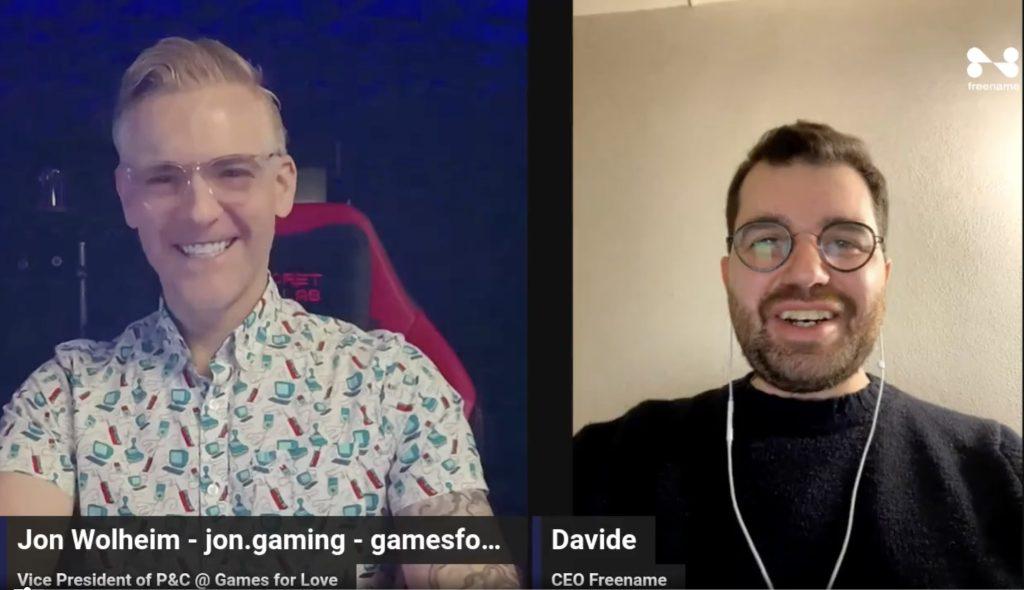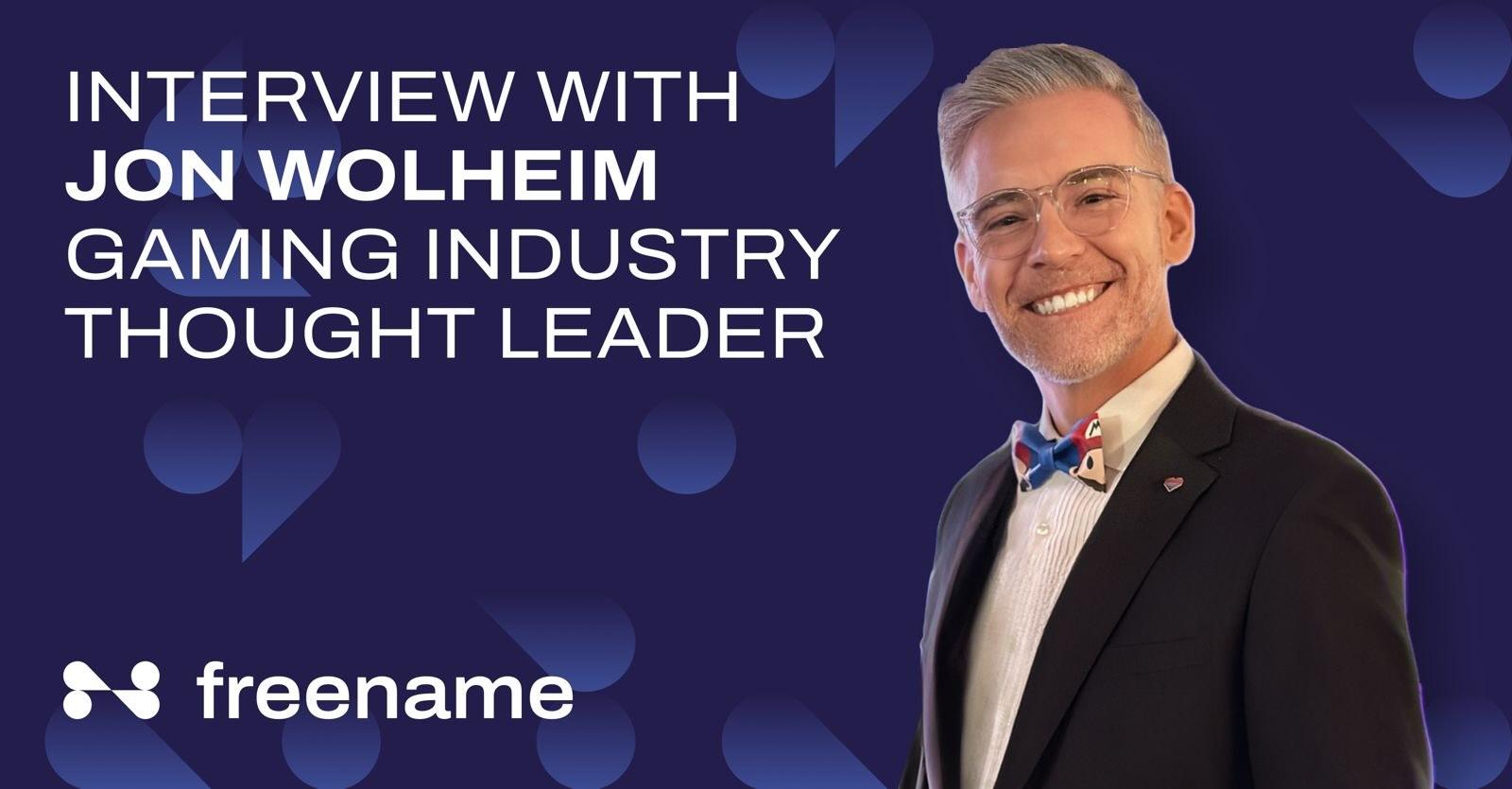In the gaming industry, few individuals can match the spirit and enthusiasm of Jon Wolheim. With a career spanning 17 years in the gaming sector, Jon has not only witnessed but also contributed to the phenomenal evolution of the gaming world. In an exclusive interview with Freename.io, Jon shared his insights, experiences, and predictions for the future of gaming and technology.
From his early days as a passionate player of games at the tender age of four, Jon’s love for gaming has been a constant. His journey has seen him work with tech giants like Apple and Amazon. He contributed to the hiring of instrumental teams including the one behind the Apple Watch. Yet, it’s his current role as the Head of People and Culture at Games for Love, a non-profit organization, that he is most proud of.
“At Games for Love, we play video games at children’s hospitals to replace pain with play… because we know that when you feel better, you heal better,” Jon explains. “We love what we do. It’s incredible to see kids really have their lives changed, staying connected to their families, and finding meaning and purpose in the midst of some really dark times.”
Before joining Games for Love, Jon’s career trajectory also saw him pivot towards the AI startup space. There, he joined SoundHound.ai as a Senior director. “Living every Silicon Valley dweller’s dream of taking a company public,” as he puts it, this shift allowed him to gain experience in the field of Natural Language Processing and voice-to-text technologies. It was during this period, after stepping aside to spend time with his newborn, that Jon started to explore the world of Web3. “After googling ‘WTF is Web3’, I found Freename, and then this conversation came about,” he chuckles.
Jon’s Top Predictions for the Gaming Industry
When asked about his predictions for the gaming industry in 2024 and the next five years, Jon’s enthusiasm is palpable. He sees three major trends shaping the industry’s growth. First, the inevitable role of AI in gaming development. “As you’re seeing an acceleration and movement towards general artificial intelligence… it’s certainly going to evolve how games are developed,” he remarks.
“Moore’s law is pretty much obsolete now because this technology is able to develop technology,” Jon asserts. He explains that the anticipated doubling of processing power and halving of costs every couple of years is being overshadowed by even more rapid progress. “You don’t get a doubling of power and a reduction of speed by two, and price by two every year. You’re probably going to see a 4, 8, and so on and so forth.” he says, although he acknowledges the precise implications of this trend are still unfolding.
It could have a broader societal impact, he believes. “It means job displacement, or a better way to put it, available time for all of us,” hinting at a future where automation may free up more time for leisure activities such as gaming.

He mentions that there is a massive increase in the number of new gamers entering the digital playground. “In a world where every single day approximately 835,000 people start playing games for the first time on planet earth… for the majority of these people, their primary access point will be a phone.” This massive influx of new gamers, most of whom are mobile-first, brings us to the second key trend highlighted by Jon: user-generated content (UGC).
Citing examples like Unreal Engine for Fortnite and ROBLOX, he notes, “These platforms are creating millionaires.” Jon Wolheim thinks this is the beginning of an exciting new economy. There, the lines between playing for fun and creating for profit overlap. The younger generation is leading the way, actively engaging in the gaming industry. They do this not just as consumers but as innovators and entrepreneurs. Which brings him to the third and final major trend in gaming: Web3.
Domains and Gaming
“It is only through blockchain tech that we can create non-fungible successes and derive value from our gaming experiences,” Jon asserts. He pictures a future where all those hours clocked up in games like World of Warcraft could translate into tangible value, possibly in the form of cryptocurrency or item rentals.
Jon himself has made his own venture into the Web3 domain, having registered ‘jon.gaming’ with Freename.io. “I invested in my name before I started working with Freename. I believe one day it will be worth more than my house because of this incredible decentralization,” he states. For Jon, Web3 represents a fundamental change in how identities and economies are constructed and interacted with in the digital space.
He notes that by centralizing our online personas, we make it easier for others to find us, interact with us, and engage with our digital content and assets. For a prolific gamer with a collection of rare in-game items, he says this could potentially mean the ability to monetize these assets through rental to other players. With a growing number of high schoolers setting their sights on careers as creators — gamers, streamers, YouTubers — he believes their first step should be registering a Web3 domain and taking control of their digital identity. If they manage to grow their profile, this can be a route for them to monetize their content and hopefully make a successful living.
Advice for Entrepreneurs in the Gaming Industry
Going back to his role at Games for Love, Jon Wolheim mentions that the organization is on a continuous search for volunteers. “We want our volunteers to gain real-world gaming industry experience,” Jon says, and he’s particularly passionate about this since he’s aware that all the recent layoffs in the gaming industry have made it difficult for newcomers to gain experience.
It’s clear that the gaming industry can be a tough place to navigate these days, with so much economic uncertainty. Jon mentions that he and his friends have been organizing live events on LinkedIn, and through these gatherings, there’s a chance to learn and stay updated, especially for those who might have lost their footing in the industry. “We’re all here to help each other and come together as a community in an industry that’s taken some hits,” he says.
Impacts of AI
We asked Jon how he thought AI was impacting entrepreneurialism within the gaming industry. Jon wanted to offer advice for those would-be entrepreneurs and innovators entering the industry. “Take an hour a day to play with AI. You could just be fooling around on GPT4, or you could be super advanced and learning how to code in Sequel.” He acknowledges how difficult it is for anyone to keep on top of AI. “Nobody can keep track of how fast things are changing. Not your favorite website, not your favorite blogger, not even major corporations who are developing things so quickly that the corporation next to them already made it 30 seconds before they did.” But for anyone to make their mark in the gaming industry, Jon advises that they stay ahead of the curve. “Just don’t make AI your world where you’re posting things on Linkedin clearly generated by AI,” he added.
Keeping a keen eye on where investments are flowing can also offer valuable insights for anyone in the field, Jon observes. He points out the importance of being aware of what’s new and where money is being channeled. This goes especially for emerging technologies like Web3.
Huge Investment in Web3 Game Development
Jon notes that his own interest in Web3 was piqued by seeing where influential investors like Andreessen Horowitz were putting their funds. Their significant investments in gaming studios working on Web3 projects captured his attention. In the US alone, he says there’s an impressive amount—somewhere between 300 to 400 million dollars—backing Web3 gaming ventures.
Looking globally, he says the picture is even more compelling. Particularly in the developing world and regions like Southeast Asia, investment in Web3 game development has surged. “There is at least one and a half billion dollars that have gone towards Web3 game development in the last year alone.” Jon interprets this as a strong vote of confidence in the future of the industry. “That’s a huge amount of capital and trust in an industry that who knows what this thing could be.” About the possibilities of this new gaming frontier, he says “it’s like watching rain on very fertile soil. Who knows what’s going to grow?” He believes that anyone looking for a career in gaming should position themselves to be part of that economy in a way that’s meaningful.
Answering Viewers’ Questions and Addressing Hot Topics
During our live-streamed interview, we decided to address some of the questions in the chat. One user asked Jon about the possible security issues in Web3 gaming. Jon admitted that while he wouldn’t like for anyone to get their hands on the keys to his virtual wallet, non-fungibility is making it more complicated for people to steal assets – both physical and virtual – with high-end handbag brands and game developers both investing in the technology.
Another user wonders what’s a game that changed him the most. “That’s like asking who is your favorite child!” he laughs. Pokemon Red holds a special place in his heart, having been a companion during a hospital stay in his childhood. He also mentioned Secret of Mana and World of Warcraft, the latter of which he says he loves for its sense of community – “You win together and fail together.”
A commenter asks him about his views on women entering the gaming industry and the struggles they face. Jon acknowledges the traditional male dominance but also recognizes the strides being made, noting, “There’s a big change happening,” thanks in part to organizations like Women in Games. And while the recent industry layoffs have been widespread, affecting many, Jon sees a silver lining for underrepresented groups, who he says are usually the last ones in and therefore, the first ones out. “They’re like dandelions,” he says, “ready to spread and grow elsewhere and we’re going to enter a golden era of more representation.”
.gaming Communities
He’s asked how one would go about building communities using the .gaming domain. Jon says that he believes that having a .gaming domain is invaluable. It creates a central identity that can be more impactful than a Twitch or Discord account. He thinks that these new Web3 communities will allow for lending items and monetizing in ways we haven’t seen before.
One commenter asks him what advice he would have for developers transitioning from traditional gaming to Web3. He advises a balance of skills. “There are many who can make great games, but not a lot who understand blockchain as it pertains to games,” Jon says, “so the people who will do well are people who balance their knowledge between the two.”
Finally, he’s asked the all-important question: If you could choose to be any game character, what would you be? Jon muses that sometimes the simplicity of being an NPC, like a fishing trainer in a quiet village, appeals to him. Yet, his go-to protagonist is Cloud Strife from ‘Final Fantasy 7’!
As the conversation wraps up, Jon Wolheim expresses his passion for connecting with people who share his love for gaming, regardless of the platform. He excitedly reveals that he’s just launched his own Twitch channel and extends an open invitation for everyone to come and hang out with him live. So don’t miss the chance to join in the conversation!
To watch our full interview with Jon, head over to our YouTube page:







